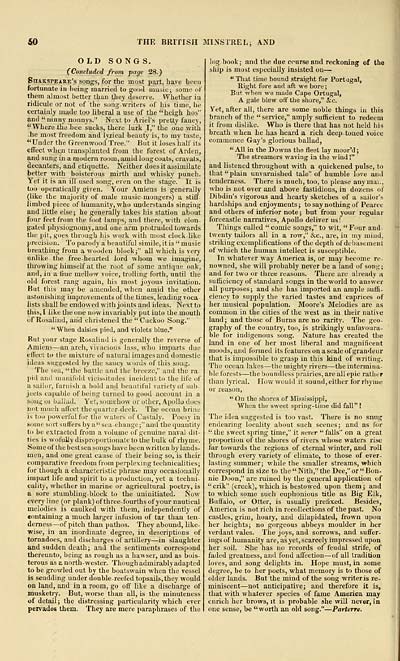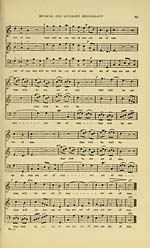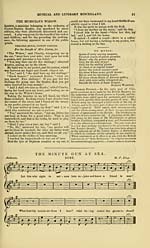Glen Collection of printed music > Printed music > British minstrel, and musical and literary miscellany
(58) Page 50
Download files
Complete book:
Individual page:
Thumbnail gallery: Grid view | List view

40
THE BRITISH MINSTREL; AND
OLD SONGS.
(Concluded from page 28.J
Shakspeare's songs, for the most part, have been
foi-tunate in l)eing married to good uiusie ; some of
them almost better than tiiey deserve. Whether in
ridicule or not of the song-writers of his time, he
certainly made too liberal a use of the " heigh hos"
and "ninny nonnys." Next to Ariel's pretty fancy,
"Where the bee sucks, there lurk I," the one with
^he most freedom and lyrical beauty is, to my taste,
"Under the Greenwood Tree." But it loses half its
effect when transplanted from the forest of Arden,
and sung in a modern room, amid long coats, cravats,
decanters, and etiquette. Neither does it assimilate
better with boisterous mirth and whisky punch.
Yet it is an ill' used song, even on the stage. It is
too operatieally given. Your Amiens is generally
(like the majority of male music- mongers) a stiff-
limbed piece of humanity, who understands singing
and little else; he generally takes his station about
four feet from the foot lamps, and there, with elon-
gated pliysiognomy, and one arm protruded towards
the pit, goes through his work with most clock-like
precision. To parody a beautiful simile, it is " music
breathing from a wooden block;" all which is very
unlike the free-hearted lord whom we imagine,
throwing himself at the root of some antique oak,
and, in a line mellow voice, trolling forth, until the
old forest rang again, his most joyous invitation.
But this may be amended, when amid the other
astonishing improvements of the times, leading voca-
lists shall be endowed with joints and ideas. Next to
this, I like the one now invariably put into the mouth
of Rosalind, and christened the "Cuckoo Song."
" When daisies pieJ, and violets blue."
But your stage Rosalind is generally the reverse of
Amiens — an arch, vivacious lass, who imparts due
eliect to the mixture of natural images and domestic
ideas suggested by the saucy words of this song.
The sea, "the battle and the breeze," and the ra-
pid and manifold vicissitudes incident to the life of
a sailor, furnish a bold and beautiful variety of sub
jects capaljle of being turned to good account in a
song oi ballad. Yet, somehow or other, Apollo does
not much affect the quarter-deck. The ocean brine
is too powerful for the waters of C'astaly. Poesy in
some sortsuffers by a"sea-change;"and the quantity
to be extracted from a volume of genuine naval dit-
ties is wofuily disproportionate to the bulk of rhyme.
Some of the best sea songs have been written by lands-
men, and one great cause of their being so, is their
comparative freedom from perplexing technicalities;
for though a characteristic phrase may occasionally
impart life and spirit to a production, yet a techni-
cality, whether in marine or agricultural poetry, is
a sore stumbling-block to the uninitiated. Now
every line (or plank) of three-fourths of your nautical
melodies is caulked with them, independently of
containing a much larger infusion of tar than ten-
derness — of pitch than pathos. They abound, like-
wise, in an inordinate degree, in descriptions of
tornadoes, and discharges of artillery — in slaughter
and sudden death; and the sentiments correspond
thereunto, being as rough as a hawser, and as bois-
terous as a north-wester. Though admirably adapted
to be growled out by the boatswain when the vessel
is scudding under double-reefed topsails, they would
on land, and in a room, go off' like a discharge of
musketry. But, worse than all, is the minuteness
of detail; the distressing paiticularity which ever
pervades them. They are mere paraphrases of the
log book; and the due course and reckoning of the
sliip is most especially insisted on —
"That time bound straight for Portugal,
Right fore and aft we bore ;
But when we made Cape Ortugal,
A gale blew oft' the shore," itc.
Yet, after all, there are some noble things in this
branch of the " service," amply sufficient to redeem
it from dislike. Who is there that has not held his
breath when he has heard a rich deep. toned voice
commence Gay's glorious ballad,
" All in the Downs the fleet lay raoor'd ;
The streamers waving in the wind I"
and listened throughout with a quickened pulse, to
that "plain unvarnished tale" of humble love and
tenderness. There is much, too, to please any mai.,
who is not over and above fastidious, in dozens of
Dibdin's vigorous and hearty sketches of a sailor's
hardships and enjoyments; to say nothing of Pearce
and others of inferior note ; but from your regular
forecastle narratives, Apollo deliver ns !
Things called " comic songs," to wit, " Four and
twenty tailors all in a row," &c., are, in my mind,
striking exemplifications of the depth of debasement
of which the human intellect is susceptible.
In whatever way America is, or may become re-
nowned, she will probably never be a land of song;
and for two or three reasons. There are already a
sufficiency of standard songs in the world to answer
all purposes; and she has imported an ample suffi-
ciency to supply the varied tastes and caprices of
her musical population. Moore's Melodies are as
common in the cities of the west as in their native
land ; and those of Burns are no rarity. The geo-
graphy of the country, too, is strikingly unl'avoura-
ble for indigenous song. Nature has created the
land in one of her most liberal and magnificent
moods, and formed its features on a scale of grandeur
that is impossible to grasp in this kind of writing.
The ocean lakes — the mighty rivers — the intermina-
ble forests — the boundless prairies, are all epic rather
than lyrical. How would it sound, either for rhyme
or reason,
"On the shores of Mississippi,
'When the sweet spring-time did fall" I
The idea suggested is too vast. There is no snug
endearing locality about such scenes; and as for
" the sweet spring time," it iiever " falls" on a great
proportion of the shores of rivers whose waters rise
far towards the regions of eternal winter, and roll
through every variety of climate, to those of ever-
lasting summer; while the smaller streams, which
correspond in size to the " Nith," the Dee," or " Bon-
nie Doon," are ruined by the general application of
"crik" (creek), which is bestowed upon them; and
to which some such euphonious title as Big Elk,
Buffalo, or Otter, is usually prefixed. Besides,
America is not rich in recollections of the past. No
castles, grim, hoary, and dilapidated, frown upon
her heights; no gorgeous abbeys moulder in her
verdant vales. The joys, and sorrows, and suffer-
ings of humanity are, as yet, scarcely impressed upon
her soil. She has no records of feudal strife, of
faded greatness, and fond affection — of all tradition
loves, and song delights in. Hope must, in some
degree, be to her poets, what memory is to those of
older lands. But the mind of the song writer is re-
miniscent — not anticipative; and therefore it is,
that with whatever species of fame America may
enrich her brows, it is probable she will never, in
one sense, be "worth an old song." — Parterre.
THE BRITISH MINSTREL; AND
OLD SONGS.
(Concluded from page 28.J
Shakspeare's songs, for the most part, have been
foi-tunate in l)eing married to good uiusie ; some of
them almost better than tiiey deserve. Whether in
ridicule or not of the song-writers of his time, he
certainly made too liberal a use of the " heigh hos"
and "ninny nonnys." Next to Ariel's pretty fancy,
"Where the bee sucks, there lurk I," the one with
^he most freedom and lyrical beauty is, to my taste,
"Under the Greenwood Tree." But it loses half its
effect when transplanted from the forest of Arden,
and sung in a modern room, amid long coats, cravats,
decanters, and etiquette. Neither does it assimilate
better with boisterous mirth and whisky punch.
Yet it is an ill' used song, even on the stage. It is
too operatieally given. Your Amiens is generally
(like the majority of male music- mongers) a stiff-
limbed piece of humanity, who understands singing
and little else; he generally takes his station about
four feet from the foot lamps, and there, with elon-
gated pliysiognomy, and one arm protruded towards
the pit, goes through his work with most clock-like
precision. To parody a beautiful simile, it is " music
breathing from a wooden block;" all which is very
unlike the free-hearted lord whom we imagine,
throwing himself at the root of some antique oak,
and, in a line mellow voice, trolling forth, until the
old forest rang again, his most joyous invitation.
But this may be amended, when amid the other
astonishing improvements of the times, leading voca-
lists shall be endowed with joints and ideas. Next to
this, I like the one now invariably put into the mouth
of Rosalind, and christened the "Cuckoo Song."
" When daisies pieJ, and violets blue."
But your stage Rosalind is generally the reverse of
Amiens — an arch, vivacious lass, who imparts due
eliect to the mixture of natural images and domestic
ideas suggested by the saucy words of this song.
The sea, "the battle and the breeze," and the ra-
pid and manifold vicissitudes incident to the life of
a sailor, furnish a bold and beautiful variety of sub
jects capaljle of being turned to good account in a
song oi ballad. Yet, somehow or other, Apollo does
not much affect the quarter-deck. The ocean brine
is too powerful for the waters of C'astaly. Poesy in
some sortsuffers by a"sea-change;"and the quantity
to be extracted from a volume of genuine naval dit-
ties is wofuily disproportionate to the bulk of rhyme.
Some of the best sea songs have been written by lands-
men, and one great cause of their being so, is their
comparative freedom from perplexing technicalities;
for though a characteristic phrase may occasionally
impart life and spirit to a production, yet a techni-
cality, whether in marine or agricultural poetry, is
a sore stumbling-block to the uninitiated. Now
every line (or plank) of three-fourths of your nautical
melodies is caulked with them, independently of
containing a much larger infusion of tar than ten-
derness — of pitch than pathos. They abound, like-
wise, in an inordinate degree, in descriptions of
tornadoes, and discharges of artillery — in slaughter
and sudden death; and the sentiments correspond
thereunto, being as rough as a hawser, and as bois-
terous as a north-wester. Though admirably adapted
to be growled out by the boatswain when the vessel
is scudding under double-reefed topsails, they would
on land, and in a room, go off' like a discharge of
musketry. But, worse than all, is the minuteness
of detail; the distressing paiticularity which ever
pervades them. They are mere paraphrases of the
log book; and the due course and reckoning of the
sliip is most especially insisted on —
"That time bound straight for Portugal,
Right fore and aft we bore ;
But when we made Cape Ortugal,
A gale blew oft' the shore," itc.
Yet, after all, there are some noble things in this
branch of the " service," amply sufficient to redeem
it from dislike. Who is there that has not held his
breath when he has heard a rich deep. toned voice
commence Gay's glorious ballad,
" All in the Downs the fleet lay raoor'd ;
The streamers waving in the wind I"
and listened throughout with a quickened pulse, to
that "plain unvarnished tale" of humble love and
tenderness. There is much, too, to please any mai.,
who is not over and above fastidious, in dozens of
Dibdin's vigorous and hearty sketches of a sailor's
hardships and enjoyments; to say nothing of Pearce
and others of inferior note ; but from your regular
forecastle narratives, Apollo deliver ns !
Things called " comic songs," to wit, " Four and
twenty tailors all in a row," &c., are, in my mind,
striking exemplifications of the depth of debasement
of which the human intellect is susceptible.
In whatever way America is, or may become re-
nowned, she will probably never be a land of song;
and for two or three reasons. There are already a
sufficiency of standard songs in the world to answer
all purposes; and she has imported an ample suffi-
ciency to supply the varied tastes and caprices of
her musical population. Moore's Melodies are as
common in the cities of the west as in their native
land ; and those of Burns are no rarity. The geo-
graphy of the country, too, is strikingly unl'avoura-
ble for indigenous song. Nature has created the
land in one of her most liberal and magnificent
moods, and formed its features on a scale of grandeur
that is impossible to grasp in this kind of writing.
The ocean lakes — the mighty rivers — the intermina-
ble forests — the boundless prairies, are all epic rather
than lyrical. How would it sound, either for rhyme
or reason,
"On the shores of Mississippi,
'When the sweet spring-time did fall" I
The idea suggested is too vast. There is no snug
endearing locality about such scenes; and as for
" the sweet spring time," it iiever " falls" on a great
proportion of the shores of rivers whose waters rise
far towards the regions of eternal winter, and roll
through every variety of climate, to those of ever-
lasting summer; while the smaller streams, which
correspond in size to the " Nith," the Dee," or " Bon-
nie Doon," are ruined by the general application of
"crik" (creek), which is bestowed upon them; and
to which some such euphonious title as Big Elk,
Buffalo, or Otter, is usually prefixed. Besides,
America is not rich in recollections of the past. No
castles, grim, hoary, and dilapidated, frown upon
her heights; no gorgeous abbeys moulder in her
verdant vales. The joys, and sorrows, and suffer-
ings of humanity are, as yet, scarcely impressed upon
her soil. She has no records of feudal strife, of
faded greatness, and fond affection — of all tradition
loves, and song delights in. Hope must, in some
degree, be to her poets, what memory is to those of
older lands. But the mind of the song writer is re-
miniscent — not anticipative; and therefore it is,
that with whatever species of fame America may
enrich her brows, it is probable she will never, in
one sense, be "worth an old song." — Parterre.
Set display mode to: Large image | Transcription
Images and transcriptions on this page, including medium image downloads, may be used under the Creative Commons Attribution 4.0 International Licence unless otherwise stated. ![]()
| Special collections of printed music > Glen Collection of printed music > Printed music > British minstrel, and musical and literary miscellany > (58) Page 50 |
|---|
| Permanent URL | https://digital.nls.uk/91435641 |
|---|
| Description | Scottish songs and music of the 18th and early 19th centuries, including music for the Highland bagpipe. These are selected items from the collection of John Glen (1833 to 1904). Also includes a few manuscripts, some treatises, and other books on the subject. |
|---|
| Description | The Glen Collection and the Inglis Collection represent mainly 18th and 19th century Scottish music, including Scottish songs. The collections of Berlioz and Verdi collected by bibliographer Cecil Hopkinson contain contemporary and later editions of the works of the two composers Berlioz and Verdi. |
|---|

